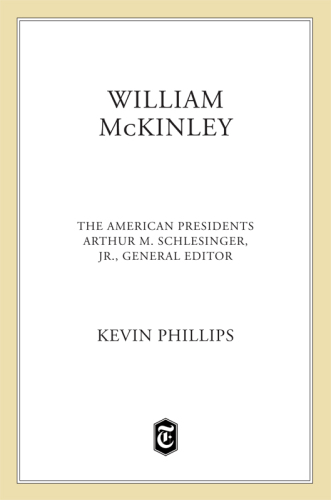
William McKinley
The American Presidents Series: The 25th President, 1897-1901
فرمت کتاب
ebook
تاریخ انتشار
2014
نویسنده
Arthur M. Schlesinger, Jr.ناشر
Henry Holt and Co.شابک
9781466866430
کتاب های مرتبط
- اطلاعات
- نقد و بررسی
- دیدگاه کاربران
نقد و بررسی

June 9, 2003
Every president probably deserves his apologist. Here, William McKinley, president from 1897 until his assassination in 1901, gets his. Phillips (Wealth and Democracy), a skilled political writer who foresaw the "the emerging Republican majority" of 1968, was an inspired choice of Arthur Schlesinger Jr., editor of the American Presidents series, to write about this chief executive who, Phillips says, also represented a new Republican alignment. The author makes about as good a case as possible for what he terms a "near great," "hinge" president whose administration prefigured so much in modern politics and policy. McKinley emerges as a strong Ohio governor and decisive president whose stern mien hid a thoughtful, even gentle, side. A Civil War veteran and Lincoln Republican, he presided over the emergence of the U.S. as a world power in the Spanish-American War, and his election in 1896 ushered in roughly 40 years of Republican political dominance. Still, it's a bit far-fetched to present McKinley as a "tribune of the people," who should get credit for many of the more progressive policies pursued by his successor, Theodore Roosevelt. What's more, the strained, clotted words that occasionally interrupt otherwise lively prose suggest too hasty writing and editing. Unlike authors of other volumes in this series, Phillips wastes space telling us what other historians have written about McKinley and arguing with many of them. But one can't fail to come away from this book with deeper knowledge of a critical moment in American governance and a warmer appreciation for a man who Phillips insists has gotten a bum rap. This little work of rehabilitation should help set McKinley's reputation right.

August 1, 2003
Poor William McKinley gets little respect as America's 25th president (1897-1901). A puppet of Wall Street and campaign manager of Mark Hanna during the Gilded Age, he is merely ranked as one of the top average presidents. Here, political analyst Phillips (Emerging Republican Majority) attempts to save the martyred commander in chief from blinded ingrates. Based on accounts by revisionist historians, his critique is less a biography than a lawyer's brief to upgrade McKinley's reputation. In his heart, Phillips is convinced that McKinley would have been a great president if his successor, Theodore Roosevelt, had not stolen the show after the assassination. Phillips pleads for a near-great ranking. Doubtless, McKinley was a genuinely nice guy and a highly popular figure, yet his "hidden hand" executive approach was undercut by the bolder vision of the multitalented Teddy. Nonetheless, this is a lively and readable defense of McKinley that will enjoy popular appeal. Recommended for public libraries and presidential collections.-William D. Pederson, Louisiana State Univ., Shreveport
Copyright 2003 Library Journal, LLC Used with permission.

July 1, 2003
Wasn't William McKinley the lackluster chief executive whose assassination left the dynamic Teddy Roosevelt president? In this latest volume in the publisher's American Presidents series, historian Phillips, author of the well-received " Cousins' Wars" (1999), shows us there is much more to McKinley. In fact, the author goes so far as to insist, "By any serious measurement, William McKinley was a major American president." Of course, Phillips is not asking that the twenty-fifth president (whose tenure ran from 1897 to 1901) be considered a first-rank chief executive, alongside Washington and Lincoln. But in this original reevaluation, he makes a strong case for placing McKinley on the "six- or eight-president second tier." Although Phillips sounds strained on occasion, he nevertheless convinces readers that McKinley was a healing, renewing, and reuniting leader--a near-great president, that is. A bold, new look that, itself, deserves a serious look. (Also see following review.)(Reprinted with permission of Booklist, copyright 2003, American Library Association.)

























دیدگاه کاربران